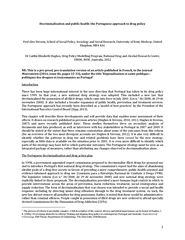Decriminalisation and public health: the Portuguese approach to drug policy
Summary
Prof Alex Stevens, School of Social Policy, Sociology and Social Research, University of Kent, Medway, United Kingdom, ME4 4AG
Dr Caitlin Elizabeth Hughes, Drug Policy Modelling Program, National Drug and Alcohol Research Centre, UNSW, NSW, Australia, 2052
Introduction
There has been huge international interest in the new direction that Portugal has taken in its drug policy since 1999. In that year, a new national drug strategy was adopted. This included a new law that decriminalised the possession of all illicit drugs, which came into force in July 2001 (Lei n.° 30/2000, de 29 de novembro 2000). It also included a broader expansion of public health, prevention and treatment services. The Portuguese approach has recently been described as a ‘model of best practices’ by the President of the International Narcotics Control Board (Sipp, 2015). This chapter will describe these developments and will provide data that enables some assessment of their effects. It draws on research published in previous articles (Hughes & Stevens, 2010, 2012; Hughes & Stevens, 2007) and more recently published data
